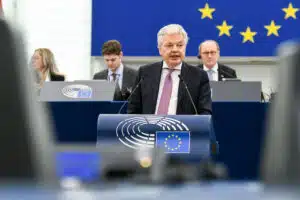Brussels – It’s not a diaspora, but it’s close. After the announcement of the president of the European Council, Charles Michel, to quit his current office (expiring Nov. 30) to stand in the EU parliamentary elections, another prominent Belgian politician at the European level may be leaving Brussels. The Commissioner for Justice, Didier Reynders, is waiting only for the support of the Belgian government headed by Prime Minister Alexander De Croo to officially run for the office of Secretary-General of the Council of Europe, in view of the expiring term currently held by Croatian Marija Pejčinović Burić.

As reported by the Belgian daily Le Soir, a verdict on the Belgian federal government’s support for the candidacy of the current head of Justice in the cabinet headed by Ursula von der Leyen, is expected on Wednesday (Jan. 10). Reynders’ intentions had been known for weeks, but Michel’s surprise decision announced at the Reformist Movement’s congress on Saturday (Jan. 6) has narrowed the field of action even more of the former minister of the same party, who is unlikely to be able to repeat himself as a commissioner or be elected as an MEP in the ranks of the party monopollised by the current president of the European Council.
That is why Reynders is now betting everything on a new attempt to lead the international organization in Strasbourg (which is not in the roster of EU institutions), after the defeat he suffered in 2019—when he was still Belgian deputy prime minister and minister of foreign affairs and defense—at the hands of the current Croatian secretary-general. If the green light from Brussels comes in these days, Reynders must then receive the support of the majority of the Council of Europe’s 46 member states, with the final vote expected in June. In the scenario in which he finally succeeds in being elected as secretary-general, it is not yet known whether he will hold office at the Berlaymont until the new European Commission takes office, or whether he will instead leave before taking office at the end of September, following the example of several of his colleagues who have left—or tried to leave—the Commission in recent years before the end of the term.
In addition to Reynders, all the Berlaymont farewells
Commissioner Reynders may be the last name on a long list, although at worst he would do so when the bell rings. Because there are nine commissioners who, unapproved or due to abandonment due to personal/election issues, have changed (or risked changing) the shape of the college as originally conceived by President von der Leyen in 2019 for the five-year term: one-third of the entire initial team, whose number of members could fall provisionally to 25 with the temporary leave of Urpilainen and the eventual election of Reynders as secretary-general of the Council of Europe.

Members of the von der Leyen Commission appointed on 10 September 2019
The first defections came due to von der Leyen’s “levities” immediately with the presentation of her team of commissioners. The Legal Affairs Committee (Juri) of the European Parliament in late September 2019 had decided to reject the names agreed between the chairwoman of the EU executive and the governments of Romania and Hungary: the Romanian Rovana Plumb (S&D) and the Hungarian László Trócsányi (Ppe) had been deemed “not capable of exercising their functions in accordance with the treaties and the code of conduct.” Two weeks later, the French Sylvie Goulard was also rejected due to the MEPs’ political spite against Paris. A year later, amid the COVID-19 health crisis, the Irish Trade Commissioner, Phil Hogan had been “pinched” for not complying with the confinement rules and the Dublin government had pushed him to resign: his post was taken over by Vice President Valdis Dombrovskis, while Irish Mairead McGuinness took over as portfolio head for Financial Services.
All other defections came in 2023. First was the Bulgarian Commissioner for Innovation, Research, Culture, Education, and Youth, Mariya Gabriel, who resigned in mid-May to aim for the office (then atteined) of deputy prime minister and foreign minister in Bulgaria. Her step back had necessitated a redistribution of offices at the Berlaymont: Executive Vice-President Vestager had been given that of Innovation and Research, while the Vice-President for European Lifestyle, Margaritis Schinas, had been given that of Education, Culture, and Youth. It all became even more complicated with the temporary leave requested and obtained by Vice-President Vestager herself to run as Denmark’s candidate for the presidency of the European Investment Bank (EIB): the whole package of the former Commissioner Gabriel passed to Vice-President Schinas, until the Bulgarian replacement, Iliana Ivanova took office. Instead, the files under Vestager’s purview were distributed between the Commissioner for Justice, Didier Reynders (Competition), and the Commissioner for Values and Transparency, Věra Jourová (Digital Policy), until Vestager’s return on December 12.

European Commission President Ursula von der Leyen on the day of the presentation of the College of Commissioners (September 10, 2019)
In August came the official resignation of the executive vice president responsible for the European Green Deal, Frans Timmermans, after being chosen in the Netherlands to lead the coalition formed by the center-left Labor Party and the Green Left GroenLinks in view of the November 22 parliamentary elections. Again, von der Leyen has split Timmermans’ mandates in two: the office of head of the European Green Deal has been given to the vice-president for Interinstitutional Relations, Maroš Šefčovič, who has also been appointed ad interim Commissioner for Climate, until the appointment of the new Dutch commissioner, Wopke Hoekstra. Finally, on November 19, the Commissioner for International Partnerships, Jutta Urpilainen, gave her willingness to stand in the presidential elections in Finland (scheduled for January 28) as a Social Democratic candidate: as of last December 2, Urpilainen is on unpaid leave and her mandate has temporarily passed to Vice-President Schinas.
English version by the Translation Service of Withub




